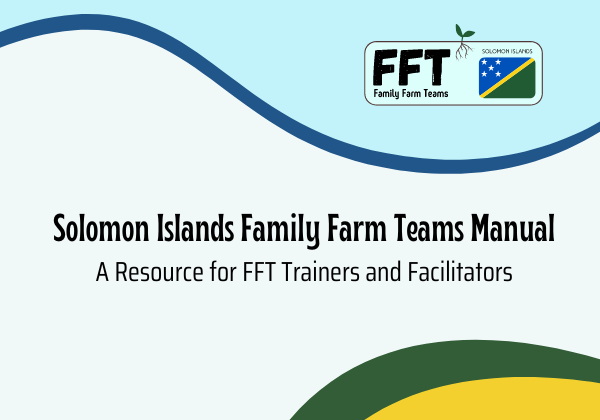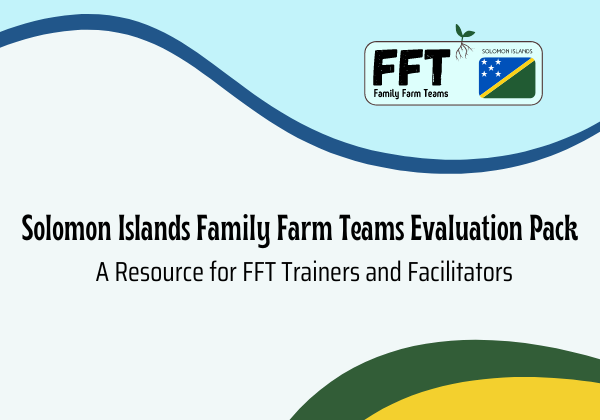Improving Agricultural Development Opportunities for Female Smallholders in rural Solomon Islands
Team Members
Australia:
Assoc Prof Deborah Hill (Project Leader)
Prof Barbara Pamphilon (Researcher)
Assoc Prof Josephine Caffery (PNG/Solomon Islands Collaborator)
Solomon Islands:
Delmay Basi (Senior Project Officer, Live & Learn Environmental Education)
Godwin Rahe (Assistant Project Officer, Live & Learn Environmental Education)
Elmah Panisi Sese (Country Manager, Live & Learn Environmental Education)
Matilda Maetala (Village Community Facilitator, Longgu District Mothers Union)
Elizabeth Damuponoa (Village Community Facilitator, Longgu District Mothers Union)
Michael Matea (Village Community Facilitator, Longgu District Mothers Union)
Gabriel Ropovono (Village Community Facilitator, Longgu District Mothers Union)
Partners
- Live & Learn Environmental Education, Solomon Islands
- Kastom Gaden Association, Solomon Islands
- Longgu District Mothers Union, Solomon Islands
This project aims to facilitate opportunities for equitable and effective agricultural development for Solomon Islands female smallholder farmers and their families.
Female smallholder farmers in rural Solomon Islands face barriers to access to agricultural training, community decision-making and economic development. This project is adapting the Family Farm Teams (FFT) approach (ASEM 2010/052 and ASEM 2014/095) to another Melanesian context to assess its applicability for scale out in the Solomon Islands and other Pacific Island Countries, and will examine opportunities to improve agricultural livelihoods for female smallholders and their families.
The project has two objectives:
- To adapt the Family Farm Team approach of agricultural extension in the Solomon Islands and assess its applicability for scale out in Solomon Islands and other Pacific Island Countries; and
- To explore opportunities to improve agricultural livelihoods for subsistence and semi-subsistence female smallholders and their families in three Solomon Islands districts and to contribute knowledge that can guide their development in the future.
The project uses a participatory action research (PAR) for development strategy. Methods within PAR include asset-based, action learning and participatory monitoring and evaluation methods. A family-based action learning method is used with community-based participants (Village Community Educators). This method underpins the Family Farm Teams modules: four sequential workshops that introduce family teams to concepts that support more effective family farming and the understanding of how livelihoods can be improved. The workshops use a combination of activities including gender-specific groups, family role analysis, family team analysis, family goal setting, family farm mapping and planning, savings plans, role-plays, communication and decision-making activities. The methods focus on the cultural and linguistic context of the community. Further community takes place through peer-to-peer teaching by Village Community Educators with their families and community.
This project’s intended outcomes for the two objectives include:
- Adaption of the FFT approach of agricultural extension in the Solomon Islands and assessment of its applicability for scale out in Solomon Islands and other Pacific Island countries.
- Increased understanding of relevant socio-cultural factors, including gender and the concept of family, that are relevant in adapting the FFT approach to agricultural development.
- Development of a Solomon Islands Family Farm Team manual.
- Increased understanding of the challenges and enablers for Solomon Island female smallholders engaged in family-based agriculture.
Collaboration with other Pacific Islands projects: Papua New Guinea
This project works in close collaboration with the current project ‘Gender-equitable agricultural extension through institutions and youth engagement in Papua New Guinea’.
To test the transferability of the FFT approach to other linguistic, religious and cultural communities in the Pacific, the two project leaders will examine and compare gender challenges and enablers in agricultural environments in PNG and the Solomon Islands.
For further information on this project, please contact Assoc Prof Deborah Hill.
![]()
This work is licensed under a Creative Commons Attribution-NonCommercial-ShareAlike 4.0 International License.



